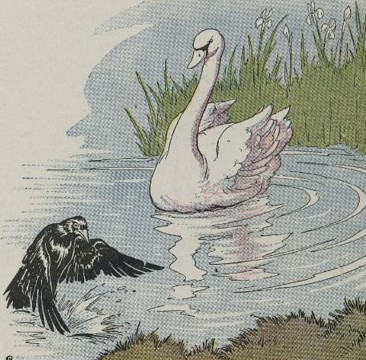PART A_1
Let’s learn vocabulary. Listen and repeat the words and the sentences with your tutor.
PART A_2
| 1. envious | /EN-vee-uhs/ |
| -wanting something another person has | |
| The crowd was envious of the performers’ talents. | |
| 2. alter | /AWL-ter/ |
| -to make different in some particular, as size, style, course, or the like; modify | |
| The teacher wanted to alter the activities she has given. | |
| 3. coal | /kohl/ |
| -a hard, black substance that is dug from the earth in lumps and used as a fuel, or a single piece of this substance | |
| The miners got lots of coal in this area. | |
| 4. woods | /woodz/ |
| -an area of land covered with a thick growth of trees | |
| The children nearly got lost in the woods. | |
| 5. marsh | /mahrsh / |
| -ground near a lake, a river, or the sea that often floods and is always wet | |
| The ravens enjoy staying at the marsh. |
PART B_1
Let’s read the story. Please read them aloud, and I will check your pronunciation and intonation.
PART B_2
A Raven and A Swan

A Raven, which you know is black as coal, was envious of the Swan, because her feathers were as white as the purest snow. The foolish bird got the idea that if he lived like the Swan, swimming and diving all day long and eating the weeds and plants that grow in the water, his feathers would turn white like the Swan’s.
So he left his home in the woods and fields and flew down to live on the lakes and in the marshes. But though he washed and washed all day long, almost drowning himself at it, his feathers remained as black as ever. And as the water weeds he ate did not agree with him, he got thinner and thinner, and at last he died.
A change of habits will not alter nature.
PART C_1
Let’s answer comprehension questions. Please answer them based on the story.
PART C_2
| 1. | How did the Raven feel towards the Swan? Why? |
| 2. | What idea did the Raven think of and what did he do about it? |
| 3. | What happened to the Raven and his plan? |
PART D_1
Let’s discuss the story. Please answer the questions below and express your opinions.
PART D_2
| 1. | What do you think the Raven should have done instead? |
| 2. | Have you ever felt the same way as the Raven? What happened? |
| 3. | How important is it to be contented with who you are? |
| 4. | Why do you think that people become envious of others? |
| 5. | What does the fable’s lesson mean to you? |
REVIEW AND FEEDBACK
Now, let us review the things that you learned in this lesson.
ではこのレッスンで学んだことを振り返りましょう。
(Please give a short feedback on how your student did on your class.)
| Grammar 文法 |
Pronunciation 発音 | Vocabulary 単語 |
Comprehension 理解 |
|
|---|---|---|---|---|
 GOOD GOOD |
文法の誤りはほとんどなく、完全な文章で話すことができる | ほとんどの単語をはっきりと正しく発音することができる | 習った表現を適切に使うことができる | 文章を理解し、質問に正しく答えることができる |
 FAIR |
文法の誤りはあるが、完全な文章で話すことができる | 発音の練習が必要な言葉がいくつかある | たまにミスはあるが、習った表現を適切に使うことができる | 文章を完全に理解するのは難しく、質問に正しく答えられないときもある |
 POOR |
文章で話すのは難しく、単語だけで話すことができる | 発音の練習が必要である | 習った単語と表現を少しだけ使うことができる | 文章を理解するのは難しく、質問に答えるのは難しい |
Parts of this lesson material are based on:
An eBook from The Project Gutenberg.
This eBook is for the use of anyone anywhere at no cost and with almost no restrictions whatsoever. You may copy it, give it away or re-use it under the terms of the Project Gutenberg License included with this eBook or online at www.gutenberg.org
An eBook from The Project Gutenberg.
This eBook is for the use of anyone anywhere at no cost and with almost no restrictions whatsoever. You may copy it, give it away or re-use it under the terms of the Project Gutenberg License included with this eBook or online at www.gutenberg.org